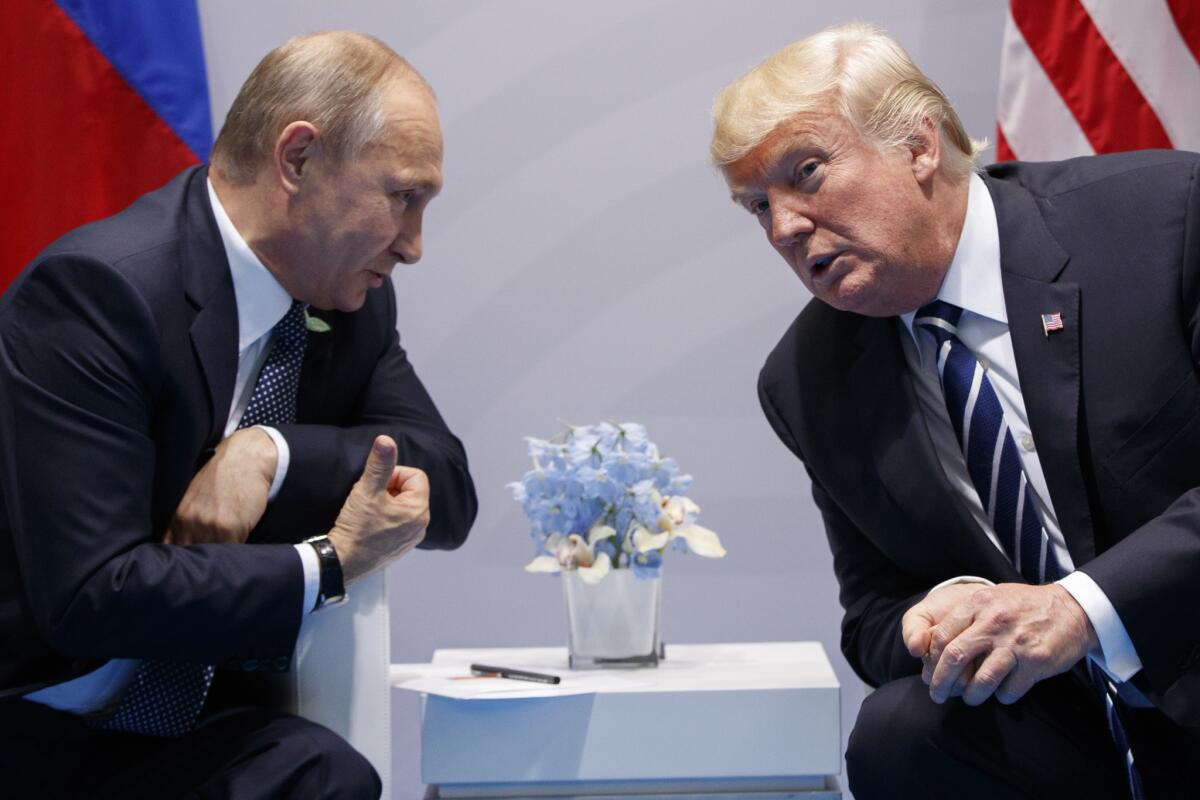Trump plans to exit arms control treaty with Russia

- Share via
WASHINGTON — The United States intends to withdraw from a treaty with Russia that allows unarmed surveillance flights over each other’s territories, President Trump said Thursday, a move that marks the latest U.S. pullback from a major international arms pact and could further strain ties with Moscow and European allies.
But the president suggested that a full U.S. withdrawal from the Open Skies Treaty — which would take place six months from now — could be averted if Russia stopped violating the agreement, as the administration accuses it of doing.
“Russia didn’t adhere to the treaty, and so until they adhere to the treaty, we will pull out,” Trump said as he left the White House for a trip to Michigan. “There’s a very good chance we’ll make a new agreement, or do something to put that agreement back together.”
Even so, the withdrawal was already being set in motion, potentially signaling an end to overflight arrangements set up decades ago to promote trust and avert conflict.
The pact has 34 signatories, including major NATO allies. The administration has briefed some about the president’s plan, officials said.
Last year, Trump removed the United States from another major international arms-control agreement with Russia, the Intermediate-Range Nuclear Forces Treaty, which dates back to 1987.
Thursday’s announcement also raised fresh doubts about the future of the New START Treaty, the only remaining American and Russian nuclear arms-control pact, which expires early next year.
The Trump administration has long signaled distaste for the Open Skies Treaty, a product of Cold War-era fears that suspected military buildups could become a flashpoint for a nuclear conflagration. The agreement was negotiated in 1992, after the fall of the Soviet Union, and took effect in 2002.
A review by the Trump administration this spring concluded that the treaty was no longer of sufficient benefit to justify the costs. In addition to alleging multiple Russian violations, the administration said it was not worth the expense to replace aging aircraft used for surveillance flights, saying those results could be obtained at lower cost by U.S. or commercial satellites.
U.S. officials complain that Russia doesn’t allow overflights of sensitive areas, including Kaliningrad, a Russian exclave between Poland and Lithuania; and the southern border of the ex-Soviet republic Georgia.
“President Trump has made clear that the United States will not remain a party to international agreements that are being violated by the other parties and are no longer in America’s interests,” national security advisor Robert C. O’Brien said in a statement before the president spoke.
Critics said a withdrawal would damage U.S. relations with European allies, who rely on reconnaissance overflights to help keep track of Russian military exercises on NATO’s eastern flank.
Michael Hayden, a former CIA director and retired Air Force general, tweeted that a U.S. pullout was “insane.”
Retired diplomat Greg Delawie, who oversaw the treaty during the Obama administration, said the pact had been useful in helping monitor Russian-backed military activity in tense areas like eastern Ukraine.
“If the treaty completely falls apart following a U.S. withdrawal, Russia will have greater freedom to make trouble in areas we care about,” he said in a statement. “This would be a gift to Russia, and a slam at the NATO alliance which depends on it.”
Senior Democrats on the House Foreign Affairs Committee and the Senate Armed Services Committee appealed to Trump last month not to move ahead with a pullout when the coronavirus crisis was already raising national security concerns and testing solidarity with allies.
“The administration’s effort to make a major change to our national security policy in the midst of a global health crisis is not only shortsighted, but also unconscionable,” Reps. Adam Smith (D-Wash.) and Eliot L. Engel (D-N.Y.), and Sens. Jack Reed (D-R.I.) and Robert Menendez (D-N.J.) wrote.
The plan to abandon the Open Skies Treaty won praise from Trump’s allies on Capitol Hill and elsewhere, however.
The treaty “started life as a good-faith agreement between major powers and died an asset of Russian intelligence,” Sen. Tom Cotton (R-Ark.) said in a statement. He derided the pact as outdated — “irrelevant as the VHS recorder or cassette deck.”
Acting Director of National Intelligence Richard Grenell — whose replacement, John Ratcliffe, won Senate confirmation Thursday — said Russia had “systematically violated” the treaty for years.
“No country should tolerate such treaty abuses and we’re taking action to right this wrong,” Grenell said in a statement. “America can’t be expected to keep its skies open to Russian monitoring flights while Russia is unwilling to reciprocate on equal terms.”
More to Read
Get the L.A. Times Politics newsletter
Deeply reported insights into legislation, politics and policy from Sacramento, Washington and beyond. In your inbox twice per week.
You may occasionally receive promotional content from the Los Angeles Times.











